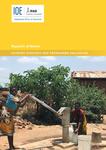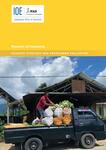Page Header
Sudan Country Strategy and Programme Evaluation
Overview
This is the second country strategy and programme evaluation conducted in Sudan by the Independent Office of Evaluation of IFAD. The report reviews the ten years between 2009 and 2018 and covers nine projects. During the evaluation period, the country experienced momentous change, due to the secession of South Sudan in 2011 (and consequent loss of oil revenues) and the coup d’état of 2019, which paved the way to civilian democratic rule. The evaluation found that IFAD’s approach was relevant to the country context and to the needs of rural poor people, also thanks to a focus on traditional rainfed agriculture. The portfolio generated successes in several key areas, including crop and livestock production, and natural resource management (NRM). At the same time, it yielded remarkable impact in terms of human and social capital, empowerment of rural communities and women. Importantly, the portfolio contributed towards reducing conflicts around natural resources, by strengthening and promoting community-level institutions and dispute resolution mechanisms. These results were complemented by investments in water resources and sustainable NRM practices. Conversely, the sustainability of benefits was mixed, especially where government resources and commitment were required. In the future, stronger partnerships, coupled with greater efforts in monitoring and evaluation, knowledge management and analytical work will enable IFAD to capitalize further on the results achieved and contribute to their scaling up. The evaluation expresses the hope that the new political context will advance the scope for advancing these gains even further.Report Details
| Year Published | |
| Type | |
| Joint | No |
| Partner/s | N/A |
| Consultant name | D. Abi Khalil - A.A. Abubaker Ammar - A.M. El-Khidir - S.N.A. Elmahi - N. Nicholson - M.T. Tohami - C. Calvosa Williams - S. Ratnayake |
| Agency Focal Point | Fumiko Nakai |
| Focal Point Email | f.nakai@ifad.org |
| Managed by Independent Evaluation Office | Yes |
| Country/ies |
YOU 'RE READING
Sudan Country Strategy and Programme Evaluation











